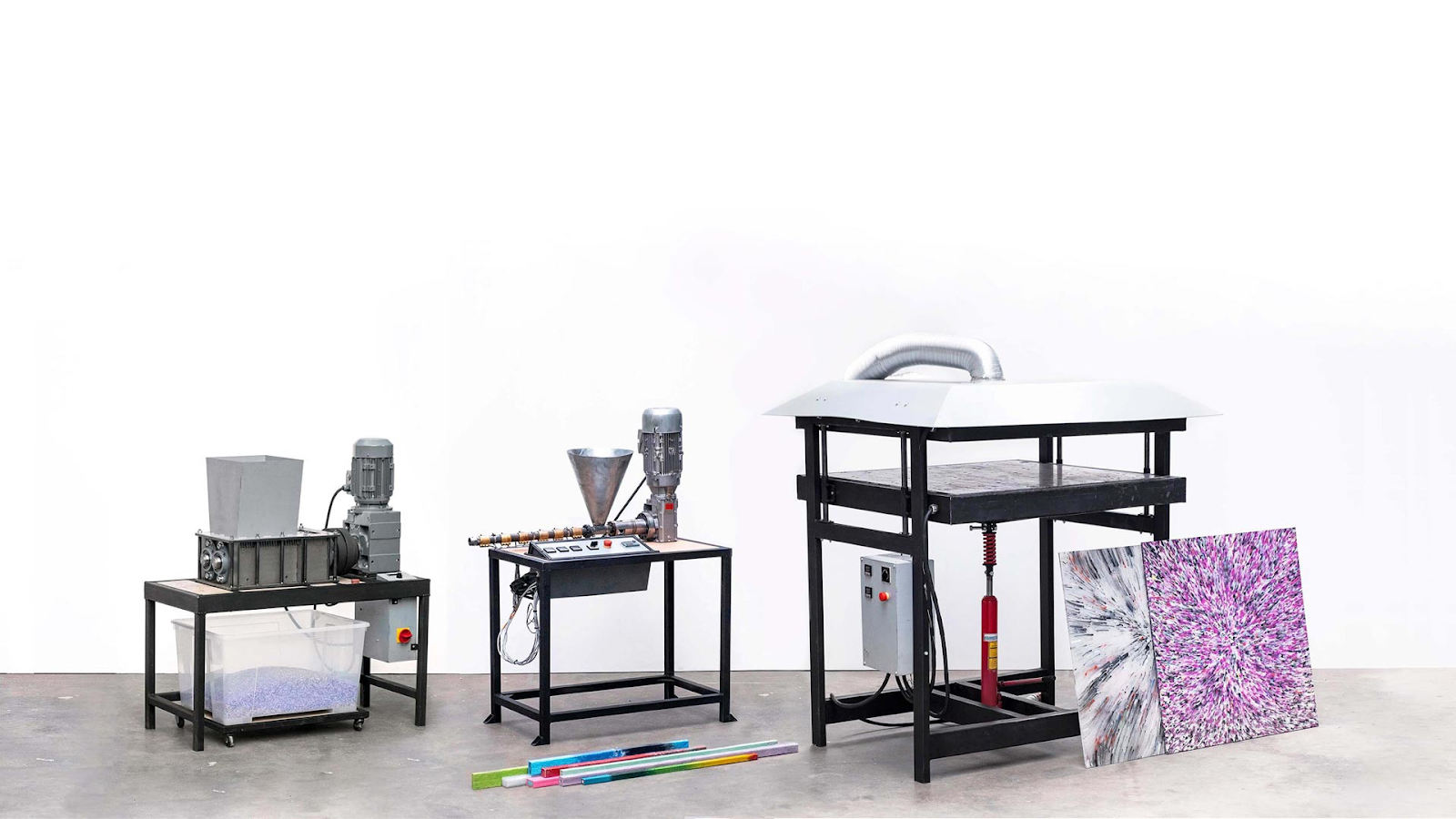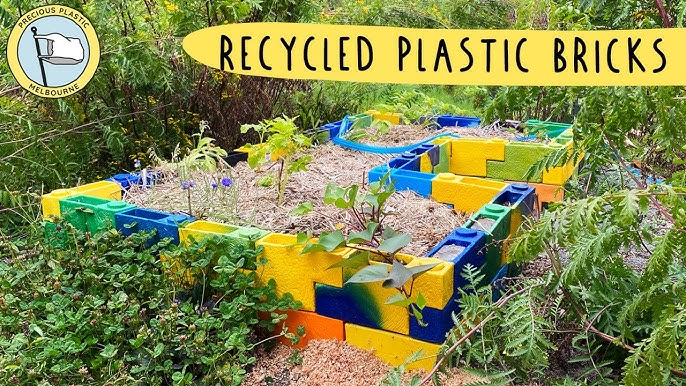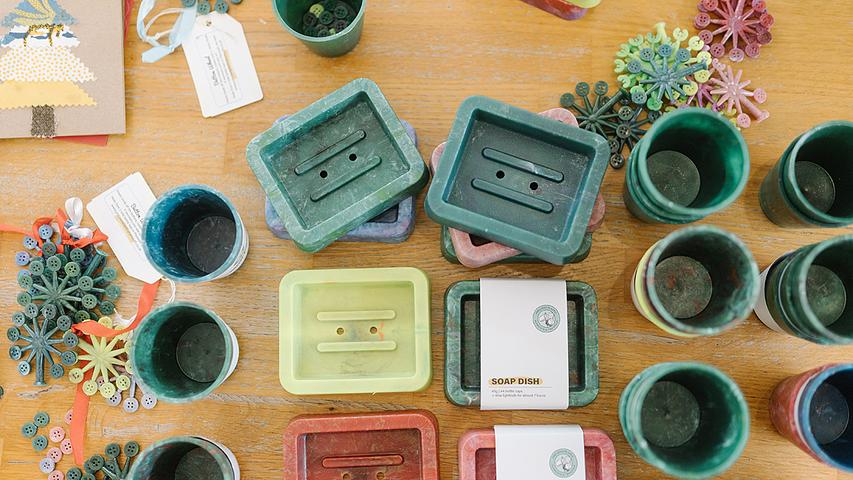1. Recycled Plastic Bricks for Community Gardens
• Product: Plastic bricks made from recycled HDPE bottle caps.
• Material: High-Density Polyethylene (HDPE) from collected bottle caps.
Process:
• Collection of plastic bottle caps from the community.
• Cleaning and shredding the plastic using Precious Plastic machinery.
• Melting and molding the shredded plastic into brick shapes.
• Application: Used in constructing structures within community gardens, such as raised beds or pathways.
Market Challenges:
• Ensuring consistent quality and durability of the bricks.
• Scaling production to meet larger construction demands.
• Navigating building regulations and standards for construction materials.
Source:
Precious Plastic Melbourne. (n.d.). Bedford Park Community Garden Case Study. Plastic Australia. Retrieved January 19, 2025, from https://www.plastic.org.au/pages/case-study-bedford-park
2. Upcycled Plastic Membership Badges
• Product: Membership badges for the Green Maker Initiative.
• Material: Recycled plastic sourced from local waste.
Process:
• Collection and sorting of plastic waste.
• Shredding the plastic into small pieces.
• Injection molding the shredded plastic into badge shapes using Precious Plastic equipment.
• Application: Distributed to members of the Green Maker Initiative as part of their membership package.
Market Challenges:
• Achieving a consistent aesthetic quality for all badges.
• Educating consumers about the value and uniqueness of recycled plastic products.
• Competing with mass-produced badges in terms of cost and production time.
Source:
Precious Plastic Plymouth and Tavistock. (n.d.). Green Maker Initiative: Membership Badges Case Study. Sustainability Hub - Low Carbon Devon. University of Plymouth. Retrieved January 19, 2025, from https://www.plymouth.ac.uk/research/sustainability-hub-low-carbon-devon/precious-plastics3. Foldable Stools and Keychains from Recycled Plastic
• Product: Foldable stools and keychains made from melted plastic bottle caps.
• Material: Various types of plastic bottle caps collected from local communities.
Process:
• Collection and cleaning of plastic bottle caps.
• Melting the plastic using Precious Plastic machines.
• Molding the molten plastic into the desired shapes for stools and keychains.
• Application: Sold as bespoke items to raise awareness about plastic waste and promote recycling.
Market Challenges:
• Ensuring product safety and durability, especially for items like stools.
• Building consumer trust in the quality of recycled plastic products.
• Establishing a sustainable business model that balances production costs and pricing.
Source:
The Star. (2023, August 18). How this Malaysian man turns recycled plastic into bespoke items. Retrieved January 19, 2025, from https://www.thestar.com.my/lifestyle/living/2023/08/18/how-this-malaysian-man-turns-recycled-plastic-into-bespoke-items
4. Upcycled Plastic Products by Precious Plastic Philippines
• Product: Various items such as hairbrushes, reusable cups, bracelets, keychains, chairs, and even canoes made from upcycled plastic waste.
• Material: Plastic bottles, bottle caps, plastic sachets, and cups collected from local waste streams.
Process:
• Collection and sorting of plastic waste.
• Cleaning and shredding the plastic using Precious Plastic machinery.
• Melting and molding the plastic into various products using different molds and techniques.
• Application: Products are sold to generate income and raise awareness about plastic pollution.
Market Challenges:
• Competing with cheap, mass-produced plastic products.
• Educating consumers about the benefits of upcycled products.
• Ensuring a consistent supply of clean plastic waste for production.
Source:
Manila Bulletin. (2024, May 24). From plastic to precious: Upcycled products by Precious Plastic Philippines. Retrieved January 19, 2025, from https://mb.com.ph/2024/5/24/from-plastic-to-precious
5. Upcycled Plastic Products by Precious Plastic Melbourne
• Product: High-end homewares range created from recycled plastic waste.
• Material: Various types of plastic waste collected from local sources.
Process:
• Collection and sorting of plastic waste.
• Cleaning and shredding the plastic using Precious Plastic machinery.
• Processing the shredded plastic into sheets or molds to create homeware products.
• Application: Sold as sustainable homeware products, promoting a circular economy.
Market Challenges:
• Achieving a consistent aesthetic quality for high-end markets.
• Educating consumers about the value of recycled plastic products.
• Scaling production to meet market demand while maintaining sustainability.
Source:
Precious Plastic Melbourne. (n.d.). Precious Plastic Melbourne. Retrieved January 19, 2025, from https://www.plastic.org.au/?srsltid=AfmBOoo7KlGvG7fLC0BLmq7YbYXqpmoemCp2CmPvmUoF7oArcPKM5Zxa






